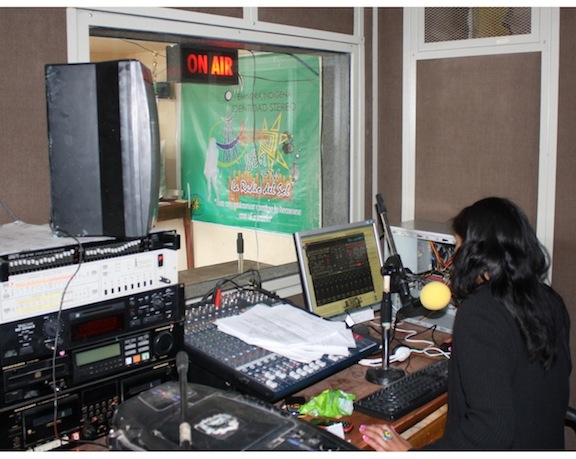

Rescuing traditions through the airwaves

The indigenous people of Colombia’s Nariño province have found a new ally in their efforts to preserve their culture -- the air waves.
"Women can now speak through a microphone - for us, this means having a voice,” says Luz Angela, a young announcer at Identity Stereo, a community radio station in the indigenous reservation of Panam. “Radio has become a space for women to claim their role in our communities."
Identity Stereo’s transmitter was recently strengthened through a joint United Nations programme supported by the MDG Achievement Fund to promote peace-building and development in Narino, a region with a high prevalence of violence and poverty, by strengthening democratic institutions and encouraging civic participation.
Radio for social change
The programme trained 15 youth aged 14 to 20 in radio production and the use of media as a tool for social change, giving them new ways to reach their communities and be heard. Identity Stereo has broached issues such as sexual and reproductive rights, gender-based violence, the new masculinity and the role of youth in strengthening communities.
"We are working with young people, where music and the programs they make are a tool to reach the community with issues that previously could not be mentioned," said Luis Dulcal, indigenous Governor of Panam, whose office is supporting the project as a means for strengthening the governance of their community.
Colombia’s indigenous people have been heavily impacted by the decades-old armed conflict between paramilitary forces and guerilla groups that has killed 250,000 people and displaced millions more.
Building peace to build livelihoods
The Joint Programme “Strengthening local capacities for peace-building in the Department of Nariño” is part of the MDG-F’s work to help countries progress towards the Millennium Development Goals by reducing conflict as a way to decrease poverty and improve health and livelihoods around the world.
The programme, a collaboration between the Colombian government and FAO, UNDP, UNICEF, UNHCR and UN Women, is using radio to strengthen cultural identity and ancestral knowledge and increase food security in indigenous communities.
It has also helped design and implement mediation and conflict resolution strategies among ethnic communities in five municipalities, strengthened transitional justice committees and trained 227 government officials and community leaders in crisis management and the protection of rights.
The programme was conceived with the goal of being replicable in other regions of the country through strategic initiatives for the prevention and management of crises and conflicts.